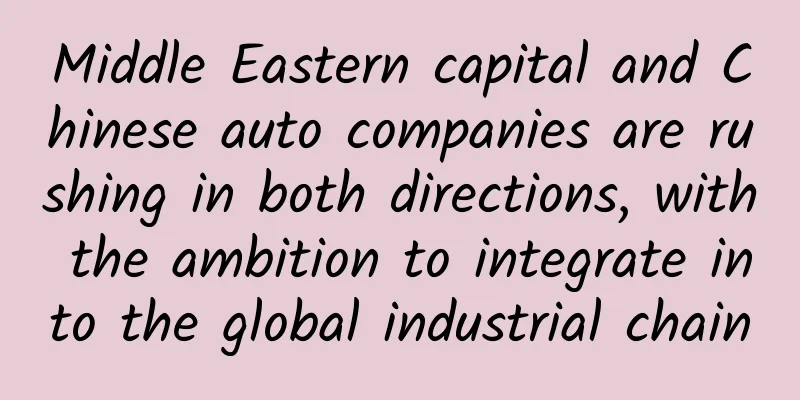Middle Eastern capital and Chinese auto companies are rushing in both directions, with the ambition to integrate into the global industrial chain

|
Last night, Abu Dhabi investment institution CYVN Holdings announced that it would invest another US$2.2 billion in NIO. Together with the US$1.1 billion invested in July, it has invested US$3.3 billion in NIO in just one year and holds 20.1% of its issued and outstanding shares, making it the company's largest shareholder. However, the company's founder Li Bin still holds voting control of NIO. In recent years, the Middle East capital with strong financial resources has actively expanded into electric vehicles and smart driving. For example, earlier, Saudi Arabia's NIF (NEOM Investment Fund) invested $100 million in Pony.ai; Saudi Arabia and Human Horizons (also known as HiPhi) signed a $5.6 billion investment agreement; in December 2022, Saudi Arabia reached a cooperation agreement with China's Skywell Auto. In addition to Chinese companies, these industrial funds in the Middle Eastern countries are also actively recruiting American electric car manufacturer Lucid and investing in Faraday Future Automobile founded by Chinese businessman Jia Yueting. Behind this series of investments is the Middle Eastern countries' desire not to over-rely on oil, and new energy has naturally become a breakthrough in investment. In fact, the frequent cooperation between Middle Eastern capital and Chinese new energy vehicle companies is a two-way effort based on a common goal. According to Li Bin, the founder of NIO, NIO will enter the UAE market and set up battery swap stations there in 2024. On the other hand, BYD and Hongqi electric vehicles from my country have already been sold in the Middle East and are being enthusiastically sought after by the market. A major automotive revolution is underway, and the Middle East has seen investment opportunities. On the one hand, they want to get rid of the current situation of over-reliance on oil and move closer to new energy; on the other hand, they also want to leverage China's strength to integrate into the global new energy industry chain. For this reason, the cooperation between Middle Eastern capital and Chinese car companies is not just a simple investment behavior. It also invites companies to build factories and set up R&D centers in the Middle East. In other words, embracing new energy is not an investment strategy of a certain country in the Middle East, but a common expectation of almost all local countries. Take the United Arab Emirates as an example. The country has a population of only 10 million, but it is prepared to invest 600 billion dirhams (1.16 trillion yuan) and plans to achieve zero emissions by 2050; Oman has a population of about 4.5 million, and it plans to replace 79% of all cars in the country with electric vehicles by 2035; Jordan, with a population of 11.3 million, imported 16,990 electric vehicles last year, and electric vehicles from China accounted for 40% of its market share, which should continue to rise steadily in the future. Among all the Middle Eastern countries, Saudi Arabia, a traditional oil-producing powerhouse, has made the most resolute investment in the field of electric vehicles. Its goal is to increase the annual production of domestic electric vehicles to 500,000 by 2030. The Saudi Crown Prince even created Ceer, the country's first independent electric vehicle brand, for this purpose. When the world enters the post-oil era, a new pattern is likely to be formed. The space for cooperation between China and the Middle East will further increase. In the field of new energy vehicles, China needs the market and investment of the Middle East, and Middle Eastern countries can use this to achieve zero emissions, get rid of oil dependence as soon as possible, realize industrial transformation, and integrate into the global industrial chain. All of this is undoubtedly what China's huge industrial system is best at. From this perspective, the resonance between China and Middle Eastern countries in the new energy industry has long written the word win-win in the memorandum. As a winner of Toutiao's Qingyun Plan and Baijiahao's Bai+ Plan, the 2019 Baidu Digital Author of the Year, the Baijiahao's Most Popular Author in the Technology Field, the 2019 Sogou Technology and Culture Author, and the 2021 Baijiahao Quarterly Influential Creator, he has won many awards, including the 2013 Sohu Best Industry Media Person, the 2015 China New Media Entrepreneurship Competition Beijing Third Place, the 2015 Guangmang Experience Award, the 2015 China New Media Entrepreneurship Competition Finals Third Place, and the 2018 Baidu Dynamic Annual Powerful Celebrity. |
>>: Jiyue Xia Yiping: The OS of future cars is a big model
Recommend
Add WeChat to receive Taobao customer operation materials worth 4980 for free!
Dear Taobao friends, if you are still worried abo...
What high-tech technology can achieve supersonic speed? An old man in the park can do it with one hand!
When we talk about supersonic speed, what do you ...
After upgrading to 4G, which mobile phone has the fastest internet speed?
Of course not Xiaomi phones. Although Lei Jun’s s...
Online event promotion planning and solution analysis
For operators, event operation is a very importan...
The stench is so strong that even butterflies and bees are horrified. How domineering is the Rafflesia?
In the Pokemon game, there is a Pokemon that emit...
From a global perspective, here are 4 tips to help you improve product activity
For all our promotions , we must identify the tar...
Rain Class: Amazon Newbie Training Camp 9th Session (Complete)
This set of courses is suitable for beginners. If...
Be careful in the rainy season! Wading in the water after the rain may cause poison
Guangzhou has been hit by heavy rains since May, ...
Daily Youxian event traffic generation tips!
In the past, when we went to the supermarket to b...
The high-speed rail speed exceeds 300 kilometers per hour, and wearing a seat belt is not safe!
Review expert: Wang Shengwei, Senior Engineer, Be...
What are the real user needs?
It is said that making products must meet user ne...
6 factors that influence banner ad clicks!
Brothers! Sisters! When you browse Taobao, do you...
How much does it cost to rent a server for small and medium-sized enterprises?
How much does it cost to rent a server for small ...
Why can we smell all kinds of smells? A very basic but extremely complex scientific question
The sense of smell is one of the earliest senses ...









